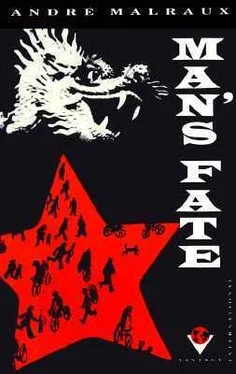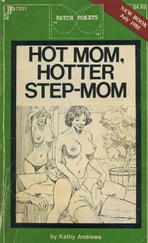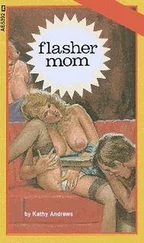Andre Malraux - Man's Fate
Здесь есть возможность читать онлайн «Andre Malraux - Man's Fate» весь текст электронной книги совершенно бесплатно (целиком полную версию без сокращений). В некоторых случаях можно слушать аудио, скачать через торрент в формате fb2 и присутствует краткое содержание. Год выпуска: 1990, Издательство: Vintage, Жанр: Современная проза, на английском языке. Описание произведения, (предисловие) а так же отзывы посетителей доступны на портале библиотеки ЛибКат.
- Название:Man's Fate
- Автор:
- Издательство:Vintage
- Жанр:
- Год:1990
- ISBN:нет данных
- Рейтинг книги:3 / 5. Голосов: 1
-
Избранное:Добавить в избранное
- Отзывы:
-
Ваша оценка:
- 60
- 1
- 2
- 3
- 4
- 5
Man's Fate: краткое содержание, описание и аннотация
Предлагаем к чтению аннотацию, описание, краткое содержание или предисловие (зависит от того, что написал сам автор книги «Man's Fate»). Если вы не нашли необходимую информацию о книге — напишите в комментариях, мы постараемся отыскать её.
As a study of conspiracy and conspirators, of men caught in the desperate clash of ideologies, betrayal, expediency, and free will, Andre Malraux's novel remains unequaled.
Man's Fate — читать онлайн бесплатно полную книгу (весь текст) целиком
Ниже представлен текст книги, разбитый по страницам. Система сохранения места последней прочитанной страницы, позволяет с удобством читать онлайн бесплатно книгу «Man's Fate», без необходимости каждый раз заново искать на чём Вы остановились. Поставьте закладку, и сможете в любой момент перейти на страницу, на которой закончили чтение.
Интервал:
Закладка:
“Dead?”
Why answer?
“Isolate the six nearest prisoners!”
“Useless,” answered Katov: “I gave them the cyanide.'’
“And you?” he finally asked.
“There was only enough for two,” answered Katov with deep joy.
(“I’m going to get a rifle-butt in my face,” he thought to himself.)
The rumble of the prisoners had become almost a clamor.
“Come on, let’s go,” said the officer merely.
Katov did not forget that he had been condemned to death before this, that he had seen the machine-guns leveled at him, had heard them fire. “As soon as I’m outside, I’m going to try to strangle one of them, and to hold my hands tightened to his throat long enough so they will be forced to kill me. They will burn me, but dead.” At that very moment one of the soldiers seized him by the waist, while another brought his hands behind his back and tied them. “The little fellows were lucky,” he said to himself. “Well! let’s suppose I died in a fire.”
He began to walk. Silence fell, like a trap-door, in spite of the moans. The lantern threw Katov’s shadow, now very black, across the great windows framing the night; he walked heavily, with uneven steps, hindered by his wounds; when the swinging of his body brought him closer to the lantern, the silhouette of his head vanished into the ceiling. The whole darkness of the vast hall was alive, and followed him with its eyes, step by step. The silence had become so great that the ground resounded each time his foot fell heavily upon it; all the heads, with a slight movement, followed the rhythm of his walk, with love, with dread, with resignation. All kept their heads raised: the door was being closed.
A sound of deep breathing, the same as that of sleep, began to rise from the ground: breathing through their noses, their jaws clenched with anguish, motionless now, aU those who were not yet dead were waiting for the whistle.
The next day
For more than five minutes, Gisors had been looking at his pipe. Before him, the lighted lamp (“which doesn’t mean that I will use it”), the little open box of opium, the clean needles. Outside, the night; in the room, the light of the small lamp and a great bright rectangle at one end-the open doorway to the next room, where they had brought Kyo’s body. The yard had been cleared for new victims, and no one had objected to the removal of the bodies thrown outside. Katov’s had not been found. May had brought back Kyo’s, with the precautions she would have taken for one severely wounded. He lay there, stretched out, not serene as Kyo, before killing himself, had thought he would become, but convulsed by the suffocation, already something else than a man. May was combing his hair before the preparation of the body for burial, speaking with her mind to the last presence of this face with horrible maternal words that she did not dare to pronounce, afraid herself to hear them. “My love,” she murmured, as she would have said, “my flesh,” knowing full well that it was something of herself, not foreign, which was torn from her; “my life. ” She perceived that it was to the dead that she was saying this. But she had long been past tears.
All grief that helps no one is absurd, Gisors was thinking, hypnotized by his lamp, finding refuge in this fascination. “Peace is here. Peace.” But he did not dare to advance his hand. He believed in no survival, had no respect for the dead; but he did not dare to advance his hand.
She came towards him, her mouth distorted by grief, her eyes staring into space. She placed her fingers gently on his wrist.
“Come,” she said in an anxious voice, almost a whisper. “It seems to me he feels a little warmer.”
He looked up into her face, so human, so grief- stricken, but betraying no delusion. She was looking at him calmly, less with hope than with the attitude of prayer. The effects of poison are always uncertain; and she was a doctor. He got up, followed her, guarding himself against a hope so strong that it seemed to him he would be unable to endure its being withdrawn. He put his hand on Kyo’s bluish brow, that brow which would never be touched by wrinkles: it was cold, with the special coldness of death. He did not dare to withdraw his fingers, to meet May’s eyes, and he kept his own eyes fastened upon Kyo’s open hand, in which the lines had already begun to disappear.
“No,” he said, returning to his distress. He had not left it. He realized that he had not believed May.
“Oh. ” she said merely.
She watched him return into the other room, hesitant. What was he thinking of? As long as Kyo was there, every thought belonged to him. This death demanded something of her, an answer which she did not know, but which existed none the less. Oh, the abject good fortune of others, with their prayers, their funeral flowers! An answer beyond anguish which tore from her hands the maternal caresses which no child had received from her, with the frightful urge that causes one to speak to the dead with the most affectionate gestures of life. This mouth which only yesterday had said to her: “I thought you were dead,” would never speak again; it was not with the derisive remnant of life-a body-it was with death itself that she must enter into communion. She stood there, motionless, wrenching from her memories so many agonies beheld with resignation, all tense with passivity in the vain welcome that she wildly offered to nothingness.
Gisors was once more stretched out on the divan. “And presently I shall have to wake up. ” How much longer would each morning bring this death back to him again? The pipe was there: peace. Advance his hand, prepare the pellet: after a few minutes, think of death itself with a limitless indulgence, as of some paralytic who might wish to harm him: it would no longer be able to reach him; it would lose its hold on him and would gently dissolve into the universal serenity. Liberation was there, within his reach. No help can be given to the dead. Why continue to suffer? Is grief an offering to love, or to fear?. He still did not dare to touch the tray, and anguish, as well as desire and repressed tears, choked him. He picked up at random the first pamphlet which his hand fell on (he never touched Kyo’s books, but he knew he would not read it). It was a copy of the Peking Politics which had faUen there when they had brought in the body and which contained the speech for which Gisors had been dismissed from the University. In the margin, in Kyo’s handwriting: “This speech is my father’s speech.” Kyo had never even told him that he approved him. Gisors folded the pamphlet gently and looked at his dead hope.
He opened the door, threw the opium into the night and came back and sat down, his shoulders drooping, waiting for the dawn, waiting for his grief to be reduced to silence, to become exhausted in its dialogue with itself. In spite of the suffering which half opened his mouth, which cast over his grave face a deforming expression of bewilderment, he did not lose all control. Tonight, his life was going to change: the power of thought is not great against the metamorphosis to which death can oblige a man. He was henceforth thrown back upon himself. The world no longer had any meaning, no longer existed: the irretrievable immobility, there, beside that body which had bound him to the universe, was like a suicide of God. He had expected of Kyo neither success, nor even happiness; but that the world should be without Kyo. “I am thrown outside of time”; the child was the submission to time, to the flow of things; no doubt, deep down, Gisors felt hope, as he felt anguish, hope of nothing, expectation, and his love had to be crushed in order that he should discover that. And yet! All that was destroying him found in him an avid welcome: “There is something beautiful in being dead,” he thought. He felt the basic suffering trembling within him, not that which comes from creatures or from things, but that which gushes forth from man himself and from which life attempts to tear us away; he could escape it, but only by ceasing to think of it; and he plunged into it deeper and deeper, as if this terrified contemplation were the only voice that death could hear, as if this suffering of being a man which pervaded him, reaching down to the very depth of his heart, were the only prayer that the body of his dead son could hear.
Читать дальшеИнтервал:
Закладка:
Похожие книги на «Man's Fate»
Представляем Вашему вниманию похожие книги на «Man's Fate» списком для выбора. Мы отобрали схожую по названию и смыслу литературу в надежде предоставить читателям больше вариантов отыскать новые, интересные, ещё непрочитанные произведения.
Обсуждение, отзывы о книге «Man's Fate» и просто собственные мнения читателей. Оставьте ваши комментарии, напишите, что Вы думаете о произведении, его смысле или главных героях. Укажите что конкретно понравилось, а что нет, и почему Вы так считаете.











